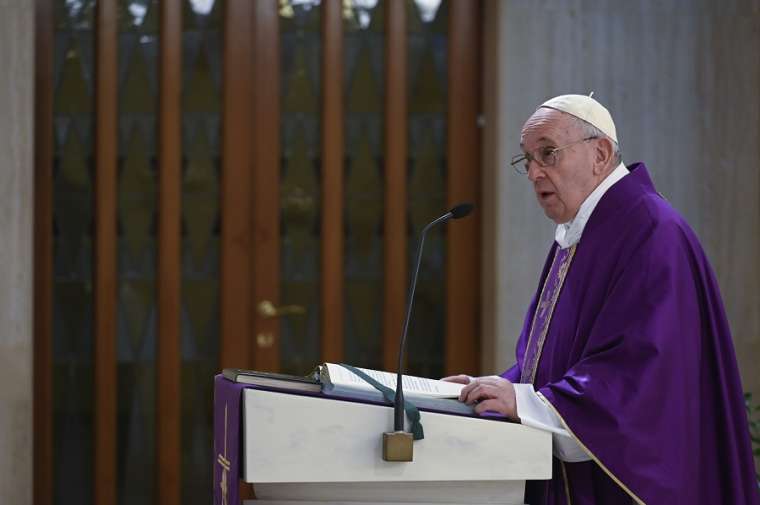Meditating on Christ’s Passion can help us as we struggle with questions about God and suffering during the coronavirus crisis, Pope Francis said at his general audience Wednesday.
Speaking via livestream due to the pandemic, the pope urged Catholics April 8 to spend time in Holy Week sitting in silent prayer before a crucifix and reading the Gospels.
At a time when churches around the world are closed, “this will be for us, so to speak, like a great domestic liturgy,” he said.
The suffering unleashed by the virus raises questions about God, the pope noted. “What is He doing in the face of our pain? Where is He when everything goes wrong? Why does He not solve our problems quickly?”
“The account of the Passion of Jesus, which accompanies us in these holy days, is helpful to us,” he said.
The people acclaimed Jesus as he entered Jerusalem. But they rejected him when he was crucified because they had expected “a powerful and triumphant Messiah,” rather than a gentle and humble figure preaching a message of mercy.
Today we still project our false expectations on to God, the Pope said.
“But the Gospel tells us that God is not like that. He is different and we could not know Him with our own strength. That is why he came close to us, he came to meet us and precisely at Easter he revealed himself completely.”
“Where? On the cross. There we learn the features of God’s face. Because the cross is God’s pulpit. It will do us good to look at the Crucified One in silence and see who our Lord is.”
The cross shows us that Jesus is “He who does not point the finger at anyone, but opens his arms wide to everyone”, the pope said. Christ does not treat us as strangers but rather takes our sins upon himself.
“To free ourselves from prejudices about God, let us look at the Crucified One,” he advised. “And then we open the Gospel.”
Some might object that they prefer a “strong and powerful God,” the pope said.
“But the power of this world passes, while love remains. Only love guards the life we have because it embraces our frailties and transforms them. It is the love of God who at Easter healed our sin with his forgiveness, who made death a passage of life, who changed our fear into trust, our anguish into hope. Easter tells us that God can turn everything to good, that with Him we can truly trust that all will be well.”
“That is why on Easter morning we are told: ‘Do not be afraid!’ [cf. Matthew 28:5]. And the distressing questions about evil do not suddenly vanish, but find in the Risen One the solid foundation that allows us not to be shipwrecked.”
At morning Mass April 8, in the chapel of his Vatican residence, the Casa Santa Marta, Pope Francis prayed for those who were taking advantage of others during the coronavirus crisis.
“Today we pray for people who in this time of pandemic exploit the needy,” he said. “They take advantage of the needs of others and sell them: the mafia, loan sharks and many others. May the Lord touch their hearts and convert them.”
On the Wednesday of Holy Week, the Church focuses on Judas, the pope said. He encouraged Catholics not only to ponder the life of the disciple who betrayed Jesus, but also to “think of the little Judas that each one of us has inside of us”.
“Each of us has the ability to betray, to sell, to choose for our own interest,” he said. “Each one of us has the possibility of letting ourselves be attracted by the love of money, or goods, or future well-being.”
After Mass, the pope presided at Adoration and Benediction of the Blessed Sacrament, leading those watching around the world in a prayer of spiritual communion.

